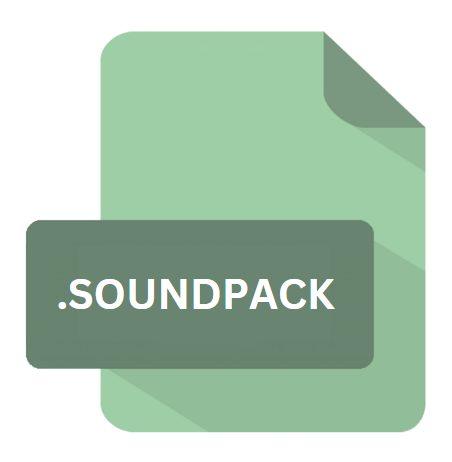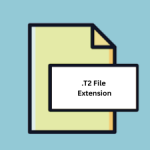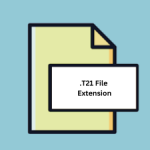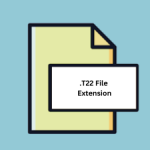.SOUNDPACK File Extension

SoundPackager Sound Package
| Developer | Stardock |
| Popularity | |
| Category | Data Files |
| Format | .SOUNDPACK |
| Cross Platform | Update Soon |
What is an SOUNDPACK file?
‘.SOUNDPACK’ files are containers for sound packages, essentially serving as repositories for an assortment of audio elements.
These packages often comprise a diverse array of sounds, including but not limited to effects, music snippets, ambient noises, and voice clips.
By consolidating these auditory assets into a single file, ‘.SOUNDPACK’ facilitates streamlined distribution and utilization, particularly within software frameworks designed for audio customization and enhancement.
More Information.
SoundPackager emerged during an era marked by a burgeoning interest in personalization and customization within the realm of digital computing.
As graphical user interfaces (GUIs) became increasingly prevalent, users sought ways to tailor their computing experiences to reflect their individual preferences and tastes.
SoundPackager filled a niche within this landscape, offering users the ability to augment the auditory aspects of their computing environments with thematic sound packages.
Origin Of This File.
The inception of the ‘.SOUNDPACK’ file format can be traced back to the development of SoundPackager, a software tool engineered by Stardock Corporation.
Initially introduced in the early 2000s, SoundPackager was conceived as a means to simplify the process of customizing audio themes and effects on Windows operating systems.
The ‘.SOUNDPACK’ extension emerged as the standardized format for packaging and deploying these auditory enhancements, enabling users to effortlessly apply thematic sound schemes to their digital environments.
File Structure Technical Specification.
‘.SOUNDPACK’ file is a structured container that houses a collection of audio files, along with metadata and configuration settings.
While the precise internal structure may vary depending on the implementation, typical components include:
- Audio Files: The primary content of the ‘.SOUNDPACK’ file consists of the audio assets themselves, encoded in formats such as WAV, MP3, or OGG.
- Metadata: Descriptive information about the sound package, including titles, authors, descriptions, and version numbers, is often included to provide context and facilitate organization.
- Configuration Settings: Parameters governing the behavior and presentation of the sound package within compatible software applications may be specified within the ‘.SOUNDPACK’ file.
How to Convert the File?
Converting ‘.SOUNDPACK’ files to alternative formats or extracting their contents may be desirable under certain circumstances.
While direct conversion methods may not be readily available due to the proprietary nature of the format, the following steps can be employed to extract the audio assets contained within a ‘.SOUNDPACK’ file:
- Extraction Software: Utilize specialized extraction software designed to unpack ‘.SOUNDPACK’ files and extract their constituent audio files. Several third-party tools may offer this functionality, providing options for converting the extracted audio to desired formats.
- Manual Extraction: Alternatively, users may manually extract individual audio files from the ‘.SOUNDPACK’ container using file archiving utilities capable of handling proprietary formats. This method may require a deeper understanding of file structures and formats.
Advantages And Disadvantages.
Advantages:
- Convenience: By consolidating multiple audio assets into a single file, ‘.SOUNDPACK’ simplifies the process of distributing and deploying thematic sound packages.
- Customization: Users can easily apply and switch between different sound packages to tailor their auditory experience to suit their preferences and moods.
- Compatibility: ‘.SOUNDPACK’ files are designed to be compatible with a variety of software applications and operating systems, enhancing their versatility and accessibility.
Disadvantages:
- Dependency: Compatibility with ‘.SOUNDPACK’ files is contingent upon the availability of software capable of interpreting and applying these packages. Users may be restricted in their options if they rely solely on applications that do not support this format.
- File Size: Depending on the contents of the sound package, ‘.SOUNDPACK’ files can potentially be large in size, especially when they include high-fidelity audio files. This may impact storage and bandwidth considerations.
- Complexity: While ‘.SOUNDPACK’ files aim to streamline the process of audio customization, managing and organizing multiple sound packages can become cumbersome, particularly for users with extensive collections.
How to Open SOUNDPACK?
Open In Windows
- Using SoundPackager: The most straightforward method to open ‘.SOUNDPACK’ files on Windows is by using Stardock’s SoundPackager software. Once installed, simply double-click the ‘.SOUNDPACK’ file, and SoundPackager should automatically recognize and apply the sound package.
Open In Linux
- Third-Party Extraction Tools: Linux users can utilize third-party extraction tools capable of unpacking ‘.SOUNDPACK’ files. Tools like Wine or Mono may allow running Windows applications like SoundPackager on Linux, providing access to the sound packages.
Open In MAC
- Using Wine or Crossover: Similar to Linux, macOS users can employ compatibility layers such as Wine or Crossover to run Windows applications like SoundPackager. Once installed, open the ‘.SOUNDPACK’ file with SoundPackager as you would on Windows.
Open In Android
- Unsupported: As of the current state, there’s no native support for ‘.SOUNDPACK’ files on Android. Users may need to explore third-party applications capable of unpacking or interpreting ‘.SOUNDPACK’ files, although such options may be limited.
Open In IOS
- Unsupported: iOS, like Android, does not natively support ‘.SOUNDPACK’ files. Due to the closed nature of the iOS ecosystem, options for opening ‘.SOUNDPACK’ files directly on iOS devices may be extremely limited or non-existent.













